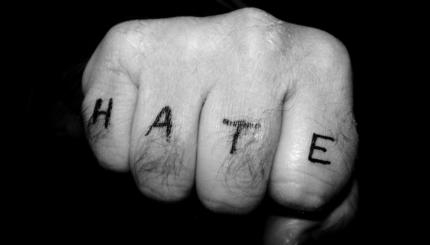
License Attribution: Noncommercial, No Derivative Works, Some rights reserved by Crushed Planet
Once a month at our family Shabbat service we ask families to submit questions in advance in what, in lieu of a sermon, is our ‘So now you know’ slot. It’s great to see what kinds of questions arise. Sometimes it is seeking explanations for why certain rituals look the way they do; sometimes it is seeking an understanding of how to interpret a particular story or text in our tradition; often it is looking to us as Rabbis to help our congregants navigate between tradition and modernity, especially at times when the logic of one of our traditions seems less clear.
This past month I was asked to address the questions of tattoos in Jewish tradition. This included, of course, the question as to the truth of the myth that a tattoo denies one burial in a Jewish ceremony. While I can’t vouch for the individual policies of specific burial societies and grounds, there is certainly no halachah that denies burial of a Jew in a Jewish cemetery on these grounds. Just as we don’t deny burial to someone for their lack of observing another of the commandments found in the Torah, such as observing Shabbat or refraining from eating non-kosher animals or fish.
I shared the historical evolution of the source and interpretation of the Torah that led to a Jewish ban on tattoos throughout the ages. These are reviewed concisely elsewhere on this site.
But then I raised some contemporary examples that demonstrate the complexities of navigating tradition and modernity in today’s world where, rather than providing answers, I offered my congregants the invitation to discuss as families how they felt about the following examples:
1) A man wishes to honor the memory of his father, a survivor of the Holocaust. Rather than tattooing his father’s number that was permanently inscribed in his skin in the concentration camps, the son chooses to have the number 6,000,000 tattooed on his arm. It is his way of never forgetting.
2) A young adult, as a sign of pride in her Jewish identity, chooses to have the Hebrew letters that spell Chai, meaning ‘life’ tattooed just above her heart. For her, it is a sign of her connection to her people and to the land of Israel – Am Yisrael Chai – the people of Israel still live.
3) A man, upon reconnecting with his sense of Jewish identity, community, and recommitting to Jewish learning, decides to have his Hebrew name tattooed on his shoulder as an outward sign of his return to his faith.
How are we to respond to these stories? Are these well intended but misguided choices? Would not a necklace or a bracelet with the same words have sufficed? Or are we living at a different time? A time when our study of the subject reveals that the origins of the law – a prohibition against idolatry – clearly do not hold in these cases. For those who are not bound by the halachic process, where later rabbinic positions are not regarded as the final word on how we observe today, the landscape of decision-making is clearly different to what it once was. We know that many Jews continue to observe and celebrate based on the additional criteria of personal meaning, and these three examples are saturated with such meaning.
I don’t have easy answers. I believe there are Jewish ways to explore the questions. And, as I reminded those in my congregation last Friday, we can all look back at photos of ourselves from past decades and regret some of the fashion choices we made. The good news is that most of us have the luxury of being able to change our clothes and update our hairstyles quite easily. Removing a tattoo is a much more costly and involved process, so there are still plenty of good reasons to pause for a good, long time before proceeding down that path, even if the threat of banishment from a Jewish cemetery isn’t one of them.
The Jewish world is full of debates. Get the latest in MyJewishLearning’s weekly blogs newsletter.
halachic
Pronounced: huh-LAKH-ic, Origin: Hebrew, according to Jewish law, complying with Jewish law.
Shabbat
Pronounced: shuh-BAHT or shah-BAHT, Origin: Hebrew, the Sabbath, from sundown Friday to sundown Saturday.
Torah
Pronunced: TORE-uh, Origin: Hebrew, the Five Books of Moses.


